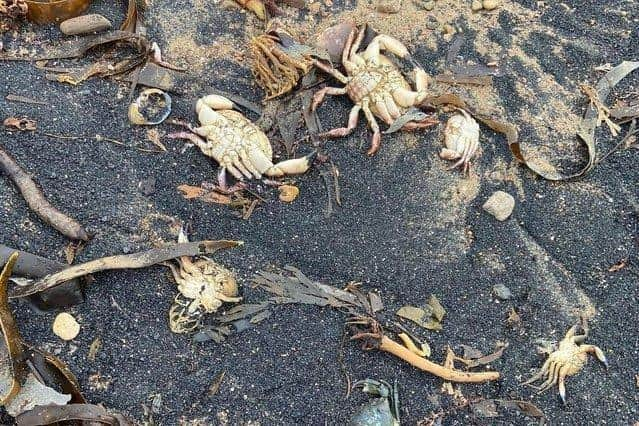Fishermen pay for independent probe into thousands of crab and lobster deaths
The dead crustaceans have washed ashore on the Yorkshire and North East coasts over the last four months, and crews claim their livelihoods are at risk because they are struggling to catch enough to cover their costs.
A group of commercial fishermen have paid marine pollution consultant Tim Deere-Jones to conduct an investigation and examine data collected by Government agencies.
Advertisement
Hide AdAdvertisement
Hide AdMarine biologist Joe Redfern, who set up a crowdfunding campaign to help pay for the independent investigation, said the findings are due to be released in the coming days.


The Department for Environment, Food and Rural Affairs (Defra) announced this week that an investigation, which involved several Government agencies, found the deaths were not caused by chemical pollution, sewage or disease and “potentially resulted from a naturally occurring harmful algal bloom”.
The natural phenomenon, which causes a rapid increase in algae, can release harmful toxins into the water.
However, some fishermen dispute the findings and believe the crustaceans died after dredging, done in the River Tees as part of the Teesside Freeport project, released harmful chemicals into the water.
Advertisement
Hide AdAdvertisement
Hide AdMr Redfern, who is also a project manager at Whitby Lobster Hatchery, said the temperature of the water in winter is usually too low for a strong algal bloom and they rarely cause deaths over a prolonged period of several months because they “die off quickly”.
He added: “I think the general consensus is that we reject the theory of the algal bloom. There’s insufficient evidence for that to be the probable cause.
“People in fishing communities are very concerned about the future of the fishing industry, the future of their livelihoods and the investments they have made.
“They want to see a healthy marine environment that is sustainable for the future.”
Advertisement
Hide AdAdvertisement
Hide AdDefra has repeatedly ruled out dredging as a probable cause, claiming there is “no evidence of a link between the disposal of dredged sediment and the deaths”.
In a statement, it said: “The sampling of sediment that has been licenced by the Marine Management Organisation for disposal to the designated sites off the Tees confirmed that no chemical determinants exceeded concentrations that would be harmful to marine life.
“There is no evidence linking any reports of dead seals around the UK coasts to the investigation on crab and lobster deaths in the North East. The joint investigation has not found any evidence of a food safety risk from healthy fish and crustacea, including crabs and lobsters caught off the North East coast.”
Comment Guidelines
National World encourages reader discussion on our stories. User feedback, insights and back-and-forth exchanges add a rich layer of context to reporting. Please review our Community Guidelines before commenting.
